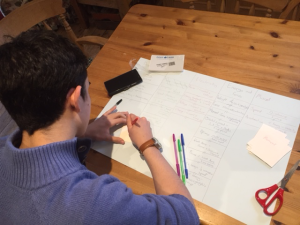It’s all about the planning! Parents need to plan too….
Help empower your child, make them feel as if they are in control and that you trust them. Help them to create a revision plan that works for them.
Tips for revision planning:
- Work out a revision timetable for each subject.
- Long periods of study can be counterproductive – the mind and body need to have regular movement breaks. Plan revision time into small chunks – hour-long sessions with short breaks at the end of each session often work well.
- Make sure your child has all the essential books and materials. A protractor that has snapped in half is useless!
- Use Post-it notes and postcards to condense notes onto – these can be used as revision prompts.
- Use large sheets of paper and colored pens to create mind maps and other diagrams – this is especially useful for visual learners.
- Buy new stationery, highlighters, and pens to make revision more interesting.
- Go through school notes with your child or listen while they revise a topic.
- Time your child’s attempts at practice papers.
The best way to support your child during the stress of revision and exams is to make home life as calm and pleasant as possible.
- It helps if other members of the household are aware that your child may be under pressure and that allowances should be made for this.
- Make your teen feel supported by being at home as much as possible so that you can share a break and a chat together to break up long revision periods.
- Encourage your child to join family meals – it’s important to have a change of scene and get away from the books and computer for a while.
- Make sure there are plenty of healthy snacks in the fridge and try to provide good, nutritious food at regular intervals.
- Take them regular drinks and snacks – hopefully you will find then studying and feel reassured.
- Exercise breaks will help your teen to keep a clear mind. This may be as simple as throwing a ball for the family dog for a few minutes, a short run around the block, or even a game of tennis with you!
- Try not to add unnecessary stress or distract from revision.
- Try not to nag …. pick your arguments! Does it really matter if there are dirty socks on the bedroom floor?
Bribes, treats and rewards
Some children are ‘bribed’ to do well in exams and are offered cash or gifts to achieve good grades. But bribery is not a good idea as it implies that the only worthwhile reward for hard work is money and that you don’t trust your child to work hard. Negative messages like these will affect your child’s sense of self-worth.
Encourage your child to do well for his or her own sake rather than for money or to please you. Explain that exams aren’t an end in themselves but a gateway to the next stage of life – A levels, university, college or work. Good results are themselves the best reward for hard work and will make your child proud of his or her achievements. Make sure your child knows you’re interested in their work and that you’ll be proud if they do well.
Consider providing small treats by way of encouragement – perhaps a piece of cake or a bacon sandwich after a chunk of revision has been completed. The end of exams can be celebrated with a treat that everyone can look forward to, such as a meal out or a trip to the cinema.
IN SHORT…..
Parents should:
- Breathe deeply
- Take up a fashionable relaxation therapy
- Block their ears when their friends talk about the top university that their children are guaranteed a place at.
- Remember that everyone resists advice these days
- Stock up on chocolate biscuits (they may stop your teen becoming hysterical)
- Look forward to the summer holidays
Teenagers should:
- Take full advantage of not having to do anything useful around the house
- Pin up a revision timetable (it makes it look like you’re doing something)
- Occasionally ask a parent to test you on something you already know (it allays anxiety)
- Give parents a copy of the exam timetable (so you can blame them if you turn up to the exam on the wrong day)
- Call any time-wasting activity “having a break”
- Make a list of all the famous and successful people who have rubbish qualifications
- Look forward to the summer holidays






